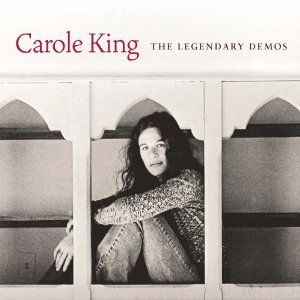Artist: Carole King
Title: The Legendary Demos
Released: May 8, 2012
Label: Hear Music / Concord 33827
Where much of pop music has been the flavor of the day, true craftsmanship stands the test of time. Carole King was a song craftsman. Here heyday was nearly two decades long and what made it last were these two-and-a-half minutes songs of love, loss, bliss, angst, protest and discovery, almost synonymous with a teen primer, but also themes that follow us through life.
The Legendary Demos is exactly what it states. These are the basic first takes of creations of King alone or with her songwriter partners. They were once pieces of paper filled with ideas that went cradled in her arms into a studio and came out as pieces with their own identities.
The album opens with “Pleasant Valley Sunday.” The song derived its name from Pleasant Valley Road, a byway that passed through West Orange, a Jersey suburb where Carole and her then-husband and collaborator, Jerry Goffin lived. Goffin’s lyrics clearly display his distaste for life in suburbia.
Where the Monkees provided the teen angst in the line “I need a change of scenery,” King possessed the only soul as she sang the travelogue through the vapid suburban life on a “Pleasant Valley Sunday.” It is a full-fledged production, complete with fellow studio hands, written for Don Kirshner and his pre-fab four.
Like “Just Once In My Life” (which was made famous by the Righteous Brothers), these songs are transitional in King’s career, bridging the gap between Bobby Vee’s teenybopper take on “Take Good Care Of My Baby” to the more poignant Toni Stern-King composition, “It’s Too Late.” While “It’s Too Late” approaches the lyrical phrasing and sound of the song we’d grow to know from Tapestry, “Take Good Care of My Baby,” really sounds like a sweet young lady pitching a song and carries a certain charm.
“Just Once In My Life” was composed to be the follow-up to the Righteous Brothers smash hit, “You’ve Lost That Loving Feeling.” The composition shows King’s professional approach of custom-tailoring a song for an artist, as well as producer Phil Spector. Her self-harmonies suggesting the parts for the Brothers to harmonize and the distinct conversation in the verses serve this song to Medley and Hatfield on a gold plated platter. The same can be said for her demo of “Crying In The Rain,” this time with the Everly Brothers as the prospective purveyors.
There are thirteen tracks included on The Legendary Demos. It’s interesting and enjoyable to hear a work in progress. Many of the songs were later slightly tweaked by the artist or given the full attention of a studio from a producer, really not veering far from King’s delivery. That shows the amount of respect she held in the music business. Not only are the demos legendary, so is Ms. King.
Grade: A



